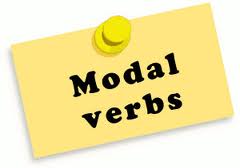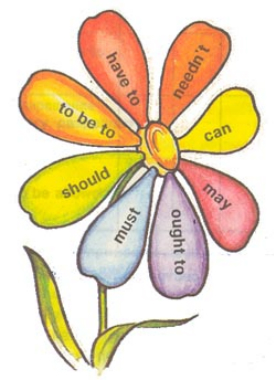He told a lie about what he do that day
He told a lie about what he do that day
Английский язык 6 класс (рабочая тетрадь) Афанасьева. UNIT Six. V. Writing. Номер №34
Write the story again making it more colourful. 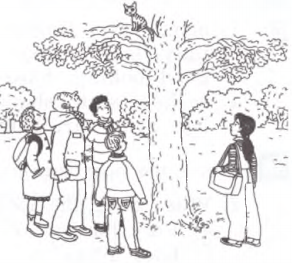
He Never Told a Lie
One day an old gentleman was walking through the park. He saw a group of children standing near a tree. There was a cat in the tree. The gentleman came to the tree and asked what they were doing. One of the boys told him that they were having a competition. “We are telling lies,” said the boy. “And the one who tells the biggest lie will keep a cat.”
The gentleman thought it was a good chance to teach the children a lesson. He told them that their competition was unusual. And then he said: “You know, I never told a lie in my life.” All at once the children began to laugh and they shouted, “The cat is yours, sir.”
Английский язык 6 класс (рабочая тетрадь) Афанасьева. UNIT Six. V. Writing. Номер №34
Решение
Перевод задания
Напишите историю еще раз, сделав ее более красочной.
Он никогда не говорил неправду
Однажды старый джентльмен шел по парку. Он увидел группу детей, стоящих возле дерева. На дереве была кошка. Джентльмен подошел к дереву и спросил, что они делают. Один из мальчиков сказал ему, что у них есть соревнование. «Мы лжем», − сказал мальчик. «А тот, кто расскажет самую большую ложь, возьмет эту кошку».
Джентльмен подумал, что это хороший шанс преподать детям урок. Он сказал им, что их соревнование было необычным. А потом он сказал: «Вы знаете, я никогда не говорил ложь в моей жизни». Внезапно дети начали смеяться и закричали: «Кошка Ваша, сэр».
ОТВЕТ
He Never Told a Lie
One day an old gentleman was walking through the park. The weather was warm and sunny, the old gentleman had a wonderful mood. He saw a group of children standing near a tree. They were laughing. There was a cat in the tree. The cat was sitting there and couldn’t jump down. The gentleman came to the tree and asked what they were doing. He was quite curious. One of the boys told him that they were having a competition. “We are telling lies,” said the boy. “And the one who tells the biggest lie will keep a cat.” This competition looked very interesting.
The gentleman thought it was a good chance to teach the children a lesson. He told them that their competition was unusual. And really he never took part in such competition. And then he said: “You know, I never told a lie in my life.” All at once the children began to laugh and they shouted, “The cat is yours, sir.” They didn’t believe that it could be the truth.
Перевод ответа
Он никогда не говорил неправду
Однажды старый джентльмен шел по парку. Погода была теплая и солнечная, у старого джентльмена было прекрасное настроение. Он увидел группу детей, стоящих возле дерева. Они смеялись. На дереве была кошка. Кот сидел там и не мог спрыгнуть. Джентльмен подошел к дереву и спросил, что они делают. Ему было весьма любопытно. Один из мальчиков сказал ему, что у них есть соревнование. «Мы лжем», − сказал мальчик. «А тот, кто говорит самую большую ложь, возьмет эту кошку». Этот конкурс выглядел очень интересным.
Джентльмен подумал, что это хороший шанс преподать детям урок. Он сказал им, что их соревнование было необычным. И действительно, он никогда не принимал участия в таких соревнованиях. А потом он сказал: «Вы знаете, я никогда не говорил неправду в моей жизни». Внезапно дети начали смеяться и кричали: «Кошка ваша, сэр». Они не поверили, что это может быть правдой.
I. Если глагол в главном предложении имеет форму настоящего или будущего времени, то в придаточном предложении может употребляться любое время, которое требуется по смыслу.
Например:
I am disappointed that you have failed in Maths.
In some days I will know for sure where we will spend our summer vacations.
They have informed us that the police coped extremely well.
II. Если глагол в главном предложении стоит в одном из прошедших времен, то и глагол в придаточном предложения также должен стоять в одном из прошедших времен (включая Future-in- the-Past).
Примечание: Если в предложении несколько придаточных, правила согласования времен применяются к каждому из них.
Например:
He exсlamed he was unhappy you were in quarrel with him.
She admitted that she was awarewhat kind of problem would arise.
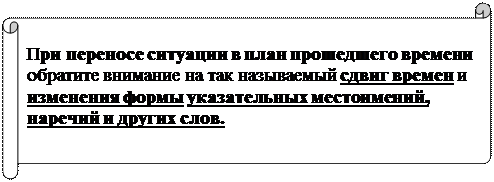 |
Table 1 :
| Present Simple ► I know that she usually cleans the flat herself. | Past Simple I knew that she usually cleaned the flat herself. |
| Present Continuous ► I know that she is cleaning the flat now. | Past Continuous I know that she was cleaning the flat then. |
| Present Perfect ► I know that she has cleaned the flat. | Past Perfect I knew that she had cleaned the flat. |
| Past Simple ► I know that she cleaned the flat last week. | Past Perfect I knew that she had cleaned the flat the previous week. |
| Future Simple ► I know that she will clean the flat next week. | Future Simple-in-the-Past I know that she would clean the flat the next week. |
| Table 2 : | |
| today, tonight here | ►that day, that night ►there |
| now this, these tonight yesterday the day before yesterday | ►then ►that, those ► that night ►the day before/the previous day ►2 days before yesterday |
| 2 years ago last night, week, month, etc. | ►2years before ►the night, week, etc., before/the previous night, week |
| tomorrow the day after tomorrow next week/year, etc. | ►the following day /the next day ►in two days’ time ►the following week /the next week/year, etc. |
 |
1.Если действие в придаточном предложении происходит одновременно с действием в главном предложении (simultaneous actions), в придаточном предложении употребляются Past Simple либо Past Continuous.
Например:
I knew that he playedtennis every day. Я знал, что он ежедневно играет в теннис.
I knew that he was playing tennis and I didn’t want to disturb him. Я знал, что он играет в теннис, и мне не хотелось его беспокоить.
Exercise 1. Translate the following sentences into Russian:


 |
1. She could not imagine what he was doing there alone.
2. I forgot what he looked like.
3. I did not know whether the doctor was experienced enough.
4. What surprised me was that Pat was so much at home there.
5. He asked me what work I was doing.
6. I was surprised you knew my name.
7. He told his father that he made ten dollars a week.
8. She informed everyone who phoned her that she was unwell and did not leave home.
9. He admitted that he felt lonely in London.
10. She warned me that it was dangerous to walk in the park alone.
Exercise 2. Change the verb in the principal clause into a past tense and make the necessary changes in the subordinate clause.

 |
 |
1. Everybody knows that Susan is strict about keeping things tidy.
2. I forget that she is always letting people down.
3. What he is saying is not true.
4. Mary complains that she is bored with the same old routine day after day.
5. He knows that his grandparents always go to church on Sundays.
6. He wants us to see that he is not hostile.
7. We know that the bridge is unsafe.
8. She can’t understand why they are trying to talk her into taking a dance course.
9. My sister agrees that she needs a shoulder to cry on.
10. I can tell from her face that she is lying.
11. We know that the company is reorganizing its departments.




1. My daughter wanted to see the new film. She found out that many good actors (star) in it.
2. She complained that Jack always (get) on her nerves.
3. We were not sure that Paul would find Mary. We were afraid he (not/know) her address.
4. I didn’t introduce Jack to Helen. I was sure they (know) each other, but it appeared they didn’t.
5. It was a pity he no longer (care) in the least about Pat.
6. He proved to everyone’s satisfaction that the drug (be) effective and harmless.
7. I knew she usually (get) in such a fuss before people (come) to dinner.
8. The Johnsons were away. We learnt that they (travel) about Canada.
9. She stayed in the whole evening. We were sure she (expect) guests.
10.I met Judy in the department store the other day. She explained that she (look) for a nice T-shirt for herself.
11.She mentioned to her colleagues that she (think) of retiring.
Exercise 4. Complete the following sentences using the words prompted.
e.g. I didn’t want to phone Mary at that late hour. I knew she (go to bed early).

e.g. The Petrovs were away. We learned that they (travel in the Caucasus).

I gave that stamp to Peter. He said he (collect stamps).
1. I saw Andrew at the bus-stop some minutes ago. He said he (wait for Jane).
2. When I phoned Victor the other day he was out. His sister told me he (play tennis in the park).
3. We made up our minds to spend the holidays in the mountains. We thought it (be a great idea).
4. I met Judy in the department store. She said she (look for a winter coat).
5. We sent a ticket to Mr. Smith. We knew he (be keen on ballet).
6. My brother wanted to see that film. He said that many good actors (star in it).
7. We were not sure Paul would find Mary. We were afraid he (not, know her address).
8. When I came home yesterday my brother was busy. I saw that he (pack his things).
9. I didn’t introduce Jack to Helen. I was sure they (know each other) but it appeared they didn’t.
2. Если действие в придаточном предложении предшествуетдействию в главном предложении (prior action), в придаточном предложении употребляется Past PerfectилиPast Perfect Continuous.
Например:
I knew (that) Bill had not had time to read my letter. Я знал, что Билл ещё не успел прочесть моё письмо.
We knew (that) they had been saving money since October. Мы знали, что они экономили деньги с прошлого года.
Exercise 1. Translate the following sentences into Russian:


 |
1. I looked at my watch and saw that we had been discussing the production plan for 3 hours.
2. It was not known where he had spent his early childhood.
3. When I saw Alec he boasted that he’d spent a month in the south.
4. When I met Mary I understood that she had been crying.
5. When I called on my friend the other day he said that he had been working at his report for a month.
6. She seemed to have forgotten what had happened a few minutes before.
7. The question was why he had sold the house.
Exercise 2. Make the actions in the following object clauses prior to those of the principal clauses.
 |
1. What she could not understand was why he (to tell) them such a pack of lies.
2. Her mother had once confided to her that she (to want) to be an actress.
3. It was probably true that he (to be) quite fond of his late brother.
4. 14.1 wondered what she (to do) there so late at night.
5. When I came to the station I saw my cousin. I understood that she (miss) the 8 o’clock train.
6. Everybody praised the film. Mary was sorry she (not/see) it.
7. It was raining hard. Mrs. Parker regretted she (not/take) an umbrella.
8. My friend called on me yesterday. He boasted he (get) two tickets for the match.
9. Harry didn’t come to the party. We thought he (not/receive) our invitation.
10. We wanted to know where she (be) all that time.
11. I found out that a professional singer (be engaged) for the concert some days before.
Exercise 3. Answer the following questions expressing priority in the subordinate clauses.
e.g. Loretta passed all her exams in June, didn’t she? (be glad; well).

 |
1. Jane found her cell-phone, didn’t she? (explain; at her friend’s)
2. Alice met John at a disco, didn’t she? (boast; two days ago)
3. Linda danced a lot at the party, didn’t she? (be happy; with Tom)
4. Did Ann go to the theatre on Sunday? (find out; with her boy-friend)
5. Did the boss force him into resigning? (complain; practically)
6. What did he do with his digital watch? (explain; sell; the day before yesterday)
7. Why did Grace join a drama club? (say; want to learn acting)
8. Why did she make so many mistakes in the test? (learn; not/work hard)
9. Why didn’t she look very happy after her trip to Rome? (complain; not/see all the sights)
10. Why is she hoovering the room again? (explain; the dog; leave hairs all over)
Exercise 4.Complete the following sentences using the words prompted.
e.g.I didn’t think Mike would come with us. I knew he (see that performance before).
 |

 |
1. When I came to the station I saw my cousin. I understood that he (miss the 8 o’clock train).
2. Alice was busy yesterday. She said she (type all day long).
3. Everybody praised the film. Mary was sorry she (not, see it).
4. It was raining hard. Mrs. Parker regretted that she (not, take an umbrella).
5. Jack was happy that he had got a ticket. He said he (stand in a queue for two hours).
6. I was sorry that Peter had failed his exam. I knew that he (prepare for it for a long time).
7. My brother called on me yesterday. He said he (buy tickets for the match).
8. Mother looked very tired when I returned home this afternoon. She said she (clean the flat).
9. I was surprised that Betsy didn’t know the news. I was sure her husband (tell her everything).
10. Harry didn’t come to the party. We thought he (not, receive our invitation).
Например:
I knew (that) Bill would come to see me after 10 P.M. Я знал, что Билл придёт ко мне после 10 часов вечера.
I was sure (that) the children would still be watching TV when I came. Я был уверен, что дети все еще будут смотреть телевизор, когда я приду.
Exercise 1. Transform the following sentences referring them to the past:


 |
1. Mother hopes that her junior son will be back tomorrow.
2. We are sure that it will be better to call at the Department store on our way home.
3. No one in the company can predict in what way the problem will be settled.
4. The editor insists that the article will be published immediately.
5. I have always believed that one day I will see him again.
6. There is an announcement in the local newspaper that the prices on consumer goods will rise next year.
7. The weather forecast says that it will pour with rain in two days’ time.
8. He predicts that he will discover the tiny particle during his next experiment.
9. He insists that the reforms will save the system, not destroy it.
Exercise 2. Open the brackets using the right adverbials.
1. A couple of weeks ago my son asked me to take him to the circus. I promised that we would go there (next week, the next week).
3. The students understand they won’t be allowed to leave until (the next day, tomorrow).
4. John promised me some days before that he would call on my parents (next, the following) Sunday and tell them I was O.K.
5. They’ve announced that the exam on Linguistics will be put off till the end of (next, the next) term.
6. There was very strong hope that the wounded man would survive by (next, the next) morning.
7. 


8. I intended to visit Helen in hospital last Friday, but her husband phoned me on Thursday and said that the doctors would discharge her from hospital (the day after tomorrow, in two days’ time).
9. Last year he promised his wife that they would definitely spend (next, the next) summer at the seaside.
10. We arrived in Turin on Monday and decided that (next, the following) day we would leave for Rome.
11. I hope that we will leave for the South (next week, the next week).
Exercise 3. Complete the following sentences using the words prompted.
e.g. I was out when my friend dropped in. I didn’t think he (come so early).
I was out when my friend dropped in. I didn’t think he would come so early.
1. On Friday I saw Lucy. I learned she (go abroad soon).
2. Nick didn’t want to stay at his relatives’. He decided that he (put up at a hotel)
3. I felt worried. I was afraid Jane (be late).
4. There were a lot of good actors in the cast. I thought that the film (be interesting)
5. John came by train. I was sure he (fly).
6. The task was too difficult for me. My friend promised he (help me).
7. Paul had already seen the play. He was sure we (enjoy it).
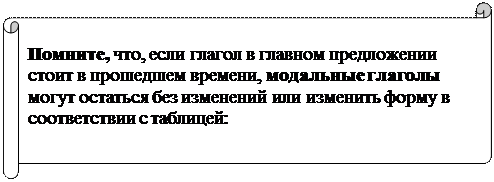 |
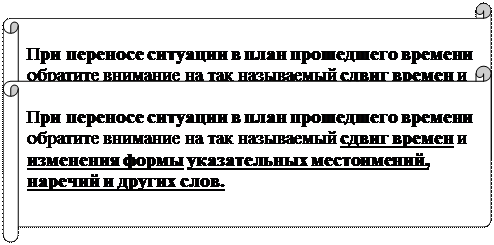 |
| must | ► must (or had to) |
| have to | ► had to |
| can | ► could/would be able to (future reference) |
| may | ► might |
| will | ► would |
Exercise 1. Transform the following sentences referring them to the past.
Student A: Student B:
 |
 |
 |
1. She complains she mustpay all the money back at a time.
2. He thinks that as far as we have bought all the books we needn’t go to the library.
3. The notice says that people mustn’t smoke inside the theatre..
4. My friend thinks I shouldget my car repaired.
5. We can’t believe that it may be so important, but it is.
6. It is clear that Helen needn’t worry as Ken will not be late.
7. The coach says that I must train very hard to develop muscles like that.
8. We know the machine can perform two million calculations per second.
10. They explain that I should see the doctor first.
11. It is evident they can’t control the situation.
 |
 |

Например:
My boss informed me about the work he is planning.
He was not able to pass his exams because he does not work hard.
It was not so stuffy yesterday as it is now.

Например:
The teacher said that the ice melts when the temperature rises above 0ºC.
He explained to us very clearly how computers work.

Например:
– I’ve just phoned Steve.
– What did he say?
– He said there it was freezing hard in Paris yesterday.

Например:
Agatha wroteto me saying that her father ownsa factory.

Например:
I knew that his son graduatedfrom the Universityin 1988.
Exercise 1. Open the brackets, using proper tense forms. Explain why the rules of the Sequence of Tenses may not be observed in the following sentences:
 |
1. Stella remarked that she (return) from the office a minute ago.
2. Paul was sure he (meet) Sarah in Moscow in July 2006, but he didn’t remember the exact date.
3. Nobody could imagine that the Earth (rotate) round the Sun before Galileo.
4. My brother was much thinner in his childhood than he (be) now.
6. The advertisement read that the swimming-pool (be) free, but when we got there, we found we had to pay.
7. He rejected the job of an interpreter as he (not to speak) foreign languages well enough.
8. We discussed our holiday plans because we (have) a two-week leave in a month.
9. I couldn’t even think that the woman who (live) nextdoor was so friendly.
10. I was going to get a cup of coffee, but Reter just explained that the machine (be) out of order. It’s going to be fixed tomorrow.
11. They announced on the radio that the Queen (come) here next month. Isn’t that exciting?
12. When the Chairman spoke to reporters yesterday, he admitted that the company (be) now in a much better financial position.
13. I didn’t know that the man who normally (work) here was ill.
TEST
TASK I.Pick out the correct variant.
1. Steve promised (that)
a) he comes soon;
b) he had not come;
c) he would come soon.
3. Andrew explained (that)
a) he is having a vacation soon;
b) he had had a vacation two weeks before;
c) he will have a vacation the following week.
4. Kevin didn’t know (that);
a) he must report on the problem tomorrow;
b) he would have to report on the problem the following day
c) he has report on the problem long ago.
5. Tom explained (that)
a) he can’t attend the lecture last Monday;
b) he couldn’t attend the lecture the previous Monday;
c) he won’t attend the lecture on Monday.
6. The farmer hoped (that)
a) the weather will be better better next summer;
b) the weather would be better the following summer;
c) the weather had been better next summer.
7. All the students knew (that)
a) a molecule of water would have two atoms of hydrogen and one of oxygen;
b) a molecule of water has two atoms of hydrogen and one of oxygen;
c) a molecule of water had had two atoms of hydrogen and one of oxygen.
TASK II. Use the proper tense forms:
Once an Englishman went to the seaside for his holidays. He asked his housekeeper to post him all the letters that she (receive) during his absence. She promised him to do that. The Englishman rested very well. A month passed but he (not to receive) any letters. He thought that it (be) strange and he (ring) up his housekeeper and asked her why she (not to post) his letters. The housekeeper explained that he (forget) to leave her the key to the letter-box. The Englishman promised that he (send) her the key. Some days later he put the key into an envelope, wrote down his address on it and posted the letter. Another month was passing. But still he didn’t receive any letters. Then at the end of the month he returned home. He spoke angrily with his housekeeper. But the poor man was not to blame because the key which his master (post) was in the locked letter-box too.
TASK III. Translate into English:
1. Я заметил, что она смотрит на меня.
2. Учительница сказала, что мы должны повторить все правила.
3. Я знаю, что вам нечего бояться.
4. Я надеялся, что кто-то нашел мои ключи и передаст их мне.
5. Он обещал, что все будет сделано.
6. Я знал, что он пожалеет об этом.
7. Я дам вам ответ, когда я поговорю с отцом.
8. Он обещал, что скажет вам, что я уже вернулся и хочу видеть вас.
9. Она боялась, что вы скажете, что не можете помочь ей.
10. Я надеялся, что я успею на последний поезд, но я опоздал.
11. Вчера по дороге домой я зашел к Николаю. Он сказал, что только что получил телеграмму от матери и через час пойдет на вокзал встречать ее.
12. Когда я зашла к моей подруге, ее мать сказала, что ее нет дома: она сдает экзамен, но скоро вернется.
TASK IV. Read and reproduce the following texts:
Нужно раскрыть скобки пожааалуйста 1?
Нужно раскрыть скобки пожааалуйста 1.
Oh, darling, pay no attention to Mr.
2. «I (starve), and my feet (kill) me.
I (want) to have a rest, » complained Grandma.
3. «Watch the road!
» cried the policeman.
«Something (happen) there.
— No, I not (joke), sir.
I’m dead serious.
5. Now, children, we (go) to the most wonderful place in the world.
6. You (think) of selling this house?
I not (think) it’s the right time to do it.
7. We still can’t understand what he (talk) about.
8. She (show) the latest collection of new designs tonight.
9. Today in this country we (face) a lot of problems.
10. — Why you (cry), Nicky?
— Can’t you see I (cut) onions?
11. Listen, you and Eric (come) for Sunday’s barbecue?
12. — You (feel) better, darling?
— Yes, I (do) fine, thank you.
13. — Have you put the kettle on to boil?
— It (whistle) already.
14. All the talk tonight is about the house which he (renovate).
15. We not (get) younger.
16. Make the tea, Jess, the kettle (screech) its head off.
17. Now clear off, I (read).
18. Hello, is that me you (look for)?
Ох, дорогая, не обращайте внимания на мистера Вонку!
2. «Я голодаю и мои ноги убивают меня.
3. «Смотри на дорогу!
— Нет, я не шутка, сэр.
Я вполне серьезно.
5. Сейчас, дети, мы попались в самое удивительное место в мире.
6. Вы думаете продать этот дом?
Я не думаю что это подходящее время, чтобы сделать это.
7. Мы до сих пор не могу понять, о чем говорит.
8. Она показала последнюю коллекцию новых дизайнов вечером.
9. Сегодня в этой стране мы у лиц множество проблем.
10. — Почему ты плачешь, Ники?
— Разве ты не видишь, я (порезать) лук?
11. Слушайте, вы и Эрик (прийти) для воскресного барбекю?
12. — Вы (чувствовать себя) лучше, дорогая?
— Да, я делаю хорошо, Спасибо.
13. — Ты поставила чайник кипятить?
14. Все разговоры сегодня о доме, который он ремонтировал 15.
Мы не получили моложе.
16. Сделать чай, Джесс, чайник визит его голову.
17. А теперь убирайся, я читаю.
18. Здравствуйте, заключается в том, что мне вы искали?
Oh, darling, pay no attention to Mr Wonka!
2. «I’m starving and my feet are killing me.
I want to rest, » complained grandmother.
3. «Watch the road!
— shouted the policeman.
«Something is going on there.
» 4. — Are you a kid?
— No, I’m not a joke, sir.
I’m quite serious.
5. Now, children, we are caught in the most amazing place in the world.
6. You think to sell this house?
I don’t think this is the right time to do it.
7. We still can’t understand what he’s talking about.
8. She showed the latest collection of new designs in the evening.
9. Today in this country we have faces many problems.
10. — Why are you crying, Nicky?
— Can’t you see I (cut) onions?
11. Look, you and Eric (come) for Sunday’s barbecue?
12. — You (feel) better, dear?
— Yes, I’m doing well, Thank you.
13. — You put the kettle to boil?
— He whistles already.
14. All the talk today about the house which he was repairing 15.
We did not get younger.
16. To make tea, Jess, kettle visit his head.
17. Now get out, I’m reading.
18. Hello, is that me you were looking for?
Complete the interview?
Complete the interview.
Use the going to form of the verbs in brackets.
__ (you / make) any chenges to the team?
We (carry on ) training as usual and we __(get) even better!
What __ (you / do ) with the money you have won?
The manager (buy) new books for the whole team.
You are all taking an important exam on Monday.
No, we__ (not worry) about that.
Talk about Russia?
Talk about Russia.
Say : what the capital of the country is what you know about the geography of the country what the country is famous for.
Переведите : hi?
Nice to see you again.
Where did you get such a great tan?
Did you go to the seaside?
Oh certainli not!
That dark soft tan onli can be from the coast of the Dead sea!
Ddid you go there this sammer?
Was the hotel expensive?
Did you like the food?
Say all you can about this place in autumn?
Say all you can about this place in autumn.
It is autumn now.
What can you say about the sky, the sun, the clouds, the trees, the grass, the flowers, the weather, the boats, the children?
Вставьте пропущенные слова в колонке wonder?
Вставьте пропущенные слова в колонке wonder.
Time you have given me.
S do you usually have for Christmas?
I must know what you (talk) about?
I must know what you (talk) about.
I hear that you (be) in this country for some time.
He ( admire) you tremendously.
He (see) the play three times.
I (not know) what Harry (say) to you.
I want to see how mush he (change) since i (see) him last.
We (be) to the pictures about twice a week ever since.
Hallo, what you (do) there at this late hour?
I (suppose) you never (have) anything to do with those people?
She (be awake) since two in the morning.
Can’t i come and see you while you (rest)?
I (hear) you (look) for a new house.
Since the tragedy Mr.
Holmes and i (hear) of many strange things.
. (happen) anything else since your arrival in London?
Задание : supply one of the Present Tenses : The Present Indefinite, the Present Continuous, the Present Perfect.
РЕБЯТА, ПОЖАЛУЙСТА ПОМОГИТЕ, СРОЧНО ОЧЕНЬ НАДО!
What (happen) to you since she (leave)?
What (happen) to you since she (leave)?
I (think) ypur daughter (become) a real beauty since I (see) her last.
What you (do) with the knife?
The point is broken off.
For these last three years I (save) hearly every penny for my trip to that country.
Well, dear, what you(do) all day long?
Come and sit hereby the fire.
Hello, he (say) holding out his hand, I(look) for you for a long time.
I never (have) the chance to thank you for what you( do) for my brother.
You se, I (do) this kind of thing for the last thirty years.
I(think) of it ever since Molly (tell) me about your decision to go to sea.
You(live here ever since you(leave) Canada?
Do come in and joing us.
We (have) coffee and (watch) TV.
Answer the questions 1)Do you like the circus?
2)Do you watch circus shows on TV or do you go to the circus?
3)What do you like to watch most of all?
Why? 4) What trainedanimals can you often see in the circus?
5) Some people think that animals are born to be free and their place is not in the circus.
What do you feel about it?
6) Why do a lot of people like the circus?
What do you know about the English language?
What do you know about the English language?
Why is it important in the modern world?
What do you think?
Think of the three questions you have about Big Ben?
Think of the three questions you have about Big Ben.
Listen and read.
Can you answer them?
1) we were waiting for the train on the platform. 2)we ussuslly have a breakfast at 9 o’clock. 7) lf they ho to Kyiv, they will visit many musseums. 8) l will dance if they played my favourite song 9)Go to the kitchen.
Ex 2 1. D 2. E 3. B 4. A 5. F 6. C Ex 3 2. Shorter 3. Bigger 4. Older / Elder 5. Younger 6. More comfortable.
1. Kazakhstan, Astana. 2. very big country 3. Many 4. Kazakh.
1) Great Britain / London 2) busy city 3)8 million 4) english.
1 1) If it (is not) too cold, I (not put) on my coat. 2) I (will write) the composition if you (do not disturb) me. 3) His vocabulary (will increase) greatly if he ( reads) fifty pages. 4) You (will go) to the Philarmonic much more often if you re..
1) used to go swimming 2) was dancing 3) were you laughing 4) used to drink 5) rode 6) was writing 7) was raining 8) used to play 9) Sang 10) was cleaning.
Are is are aren’t are isn’t is aren’t are isn’t is is.
1)I spend the time of my life right 2)The wall is very dense 3)The mouth of the river is its end 4)We make our way through the storm 5)We will win and get the main winning.
Say or Tell?
SAY Comes before or after direct speech
Say (that)…
Collocations with that: say your prayers, say yes no, say a few words, say something
Certain objects can ‘say’ things: the clock says, the letter says, the newspaper says, the label says
Phrases with say: people say _____, let’s just say (that) _____, have sth to say, say = suppose: “Say you were in my shoes, what would you do?”
TELL We tell somebody facts, opinions and information
The main structures with tell: tell sb about sth, tell sb to do sth, tell sb (that), tell sb + what/ how where, etc. + noun phrase
Phrases with tell: tell the twins apart, tell a mile off, tell tales, tell the truth, tell a lie, tell time
Notice: we also use give meaning ‘express’ in common phrases: give orders/some advice/an opinion/the details/information/directions
TALK ABOUT or SPEAK ABOUT?
To talk about something means the same as to discuss something. We can also use talk about meaning tell stories in less formal contexts.
We use speak about in more formal contexts = (to give a talk on).
1. Fill in each space with a suitable form of a verb. You can use some verbs more than once.
say tell speak talk
1) Tom _____ “This is great!”
2) She _____ that she might be late.
3) He _____ us the answer.
4) I’m going to _____ something to the neighbours about the noise.
5) She _____ us about her travels around North America.
6) _____ us about Africa.
7) I’m going to _____ something about my trip to Africa.
8) The clock _____ it’s five past ten.
9) The newspaper _____ there’s been a hijacking.
10) People _____ he’s a bit mad.
11) _____ me what you need.
12) It’s impossible to _____ the twins apart.
13) _____ we do this, what would happen?
14) Have you anything to _____ in your defence?
15) She _____ them that she might be late.
16) The policeman _____ me to go with him.
17) I _____ you the reason why I was out late.
18) I’ve never _____ a lie in my whole life.
19) Let’s _____ about the problem.
20) She often _____ about her days as a student.
21) The lecturer is going to _____ about the modern novel.
22) Let’s just _____ he doesn’t always _____ the truth.
23) The label _____ it was produced in America.
24) He _____ me to close the door.
25) “Close the door,” he _____.
26) If you have something to _____, say it now.
27) _____ her how to do it.
28) The letter _____ we’ve won first prize.
29) I didn’t do it – somebody’s been _____ tales.
30) She _____ goodbye to her parents.
PERSUADE or CONVINCE?
Persuade means make someone decide to do something, especially by asking them repeatedly or telling them reasons why they should do it.
Convince means make somebody feel certain that something is true.
DENY, REFUSE, REJECT, TURN DOWN
Deny something means say it is not true.
To refuse + to-infinitive or refuse + noun means to say you will not do something that someone asks you to do.
Reject is stronger than refuse. It means to refuse to accept, consider or use something.
Turn sb / sth down we can use this phrasal verb instead of refuse and reject.
2. Fill in each space with a suitable form of a verb. You can use some verbs more than once.
say tell speak talk discuss persuade give convince deny turn down
1)
A: People _____ that he’s been all round the world.
B: Yes, he’s always _____ about his travels.
2)
A: He was _____ us another one of his stories.
B: Does he ever _____ the truth?
3)
A: Rose is brilliant at _____ jokes.
B: I hope we can _____ her to tell us some tonight.
4)
A: Why don’t you ask the doctor to _____ you a second opinion?
B: Yes, I ought to _____ to someone else about it.
5)
A: Doctor, they _____ it’s urgent.
B: Very well, _____ them I’m on my way.
6)
A: They _____ the Prime Minister will be _____ about a new law in Parliament today.
B: I wonder what he’s going to _____ this time.
7)
A: You _____ me you were at the pub last night.
B: What are you _____ about?
8)
A: I believe what he _____.
B: I don’t. I am _____ he’s been _____ lies.
9)
A: You _____ him some good advice about his interview.
B: But he didn’t get the job. I wonder why he was _______?
10)
A: You can’t _____ that you _____ Kate my secret.
B: No, I didn’t. But it seems I can’t _____ you. Maybe we can _____ this later.
11) Her evidence _____ the court.
12) We finally _____ them of our innocence.
13) I finally _____ her to go out for a drink.
14) He refused to come in spite of our efforts to _____ him.
15) She _____ to help us.
16) They _____ her brother’s offer of help.
17) She _____ a second piece of cake.
18) He _____ all the rumours.
19) She _____ that she had stolen the money.
20) She _____ the children permission to play in the garden.
3. Read the text below and add the word which best fits each space.
talk, give, say, turn down, persuade, tell, discuss, deny, refuse, convince
A Friend in Need
I can’t say when I first realised that Billy was in trouble with the police. He had often _____(1) to me about his problems and, as his friend, I had _____(2) him the best advice I could. I also _____(3) I’d let him come and stay with me but he _____(4) my offer. I tried to _____(5) him to stop spending so much money at his club and to sit down and _____(6) his problems with me but he _____(7) me to mind my own business.
It was difficult to _____(8) to him after this, but I was _____(9) he was getting into deeper trouble all the time. He had often _____(10) having anything to do with the local gangs. But then the police came round and asked me to _____(11) them information about Billy and I couldn’t _____(12), though I avoided _____(13) them anything that might do him harm. They asked me to _____(14) them more details, but I managed to convince them that I had _____(15) the truth.
1. 1. said/says; 2. said; 3. told; 4. say; 5. told; 6. Tell; 7. say; 8. says; 9. says; 10. say; 11. Tell; 12. tell; 13. Say; 14. say; 15. told; 16. told; 17. told; 18. told; 19. talk; 20. talked;
21. speak; 22. say, tell; 23. says; 24. told; 25. said; 26. say;
27. Tell; 28. says; 29. telling; 30. said.
2. 1. A. say, B. talking; 2. A. telling, B. tell; 3. A. telling, B. persuade; 4. A. give, B. talk; 5. A. said/say, B. tell; 6. A. say, speaking/talking, B. say; 7. A. told, B. talking; 8. A. said/says, B. convinced, telling; 9. A. gave, B. turned down;
10. A. deny, told, B. convince, discuss; 11. convinced; 12. convinced; 13. persuaded; 14. persuade; 15. refused; 16. rejected/turned down; 17. refused/turned down; 18. denied; 19. denied; 20. refused/denied.
3. 1. talked; 2. given; 3. said; 4. turned down/refused; 5. persuade/tell; 6. discuss; 7. told; 8. talk; 9. convinced; 10. denied; 11. give; 12. refuse; 13. telling; 14. give; 15. told.
Compiled by Elena Kisunko, Moscow, School No. 651,
Elena Muslanova, Moscow, Lyceum No. 1537
Упражнения «Модальные глаголы» (с ответами)
1. Выберите в скобках правильный вариант модального глагола. Переведите предложения.
2. Преобразуйте предложения с модальными глаголами в прошедшее время, начиная с данных слов. Используйте could, had to, was to, was allowed to.
Н-р: Bob can’t dive. (Боб не умеет нырять.) – Last year Bob couldn’t dive. (В прошлом году Боб не умел нырять.)
3. Преобразуйте предложения с модальными глаголами в будущее время, начиная с данных слов. Используйте will be able to, will be allowed to, will have to.
Н-р: The baby can talk. (Малыш умеет разговаривать.) – Soon the baby will be able to talk. (Скоро малыш сможет разговаривать.)
4. Переведите английские пословицы, обращая внимание на модальные глаголы. Постарайтесь вспомнить русские эквиваленты пословиц, где это возможно.
Н-р: My eyes are tired. (Мои глаза устали.) – You should go to bed. (Тебе следует поспать.)
6. Составьте предложения с модальными глаголами, расставив слова в нужном порядке. Переведите получившиеся предложения.
Н-р: don’t / to / I / answer / have / questions / your. – I don’t have to answer your questions. (Я не обязан отвечать на ваши вопросы.)
Разобрать это упражнение индивидуально можно с репетиторами по английскому языку по скайпу, все занятия проходят онлайн.















